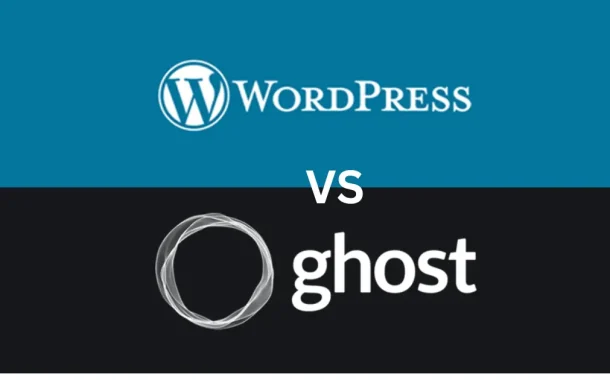Follow the realms of Ghost and WordPress, uncovering their fundamental differences, exploring design possibilities, discussing monetization strategies, and providing you with the insights needed to make an informed decision for your online presence.
Table of Contents
Table of Contents
WordPress Overview: A Dominant Player in the CMS Arena
WordPress in a Nutshell
WordPress is an open-source, highly customizable content management system that was initially designed for blogging but has since evolved into a versatile platform for creating all sorts of websites. It boasts an expansive library of plugins and themes, making it the go-to choice for millions of website owners and bloggers worldwide.
Anecdote: WordPress’s Remarkable Journey
Imagine a time when WordPress was just a blogging tool, developed by Matt Mullenweg and Mike Little in 2003. Back then, it was known as b2/cafelog. Over the years, it transformed into the powerful CMS we know today. Its journey from a niche blogging platform to a website powerhouse is a testament to its adaptability and user-friendliness.
Design: WordPress Flexibility and Customization
WordPress takes pride in its user-friendly, highly adaptable design and layout capabilities. With thousands of themes available, you can easily create a unique and eye-catching website. Whether you’re a tech-savvy developer or a newbie, WordPress provides design options to cater to your specific needs.
Monetization with WordPress
Monetizing your WordPress website is a breeze. You can integrate various revenue streams such as Google AdSense, affiliate marketing, sponsored posts, or selling your products and services. The flexibility of WordPress plugins allows you to seamlessly implement these monetization strategies.
Ghost Overview: A Fresh Take on Blogging and Publishing
The Essence of Ghost
Ghost, in contrast to WordPress, is a headless CMS designed explicitly for blogging and publishing. It prides itself on simplicity, speed, and a focus on content creation. Ghost was founded by John O’Nolan and Hannah Wolfe in 2013, with the aim of providing a streamlined alternative to the complexities of traditional CMSs.
Anecdote: Ghost’s Birth from Frustration
John O’Nolan’s frustration with the bloat and complexity of WordPress led to the creation of Ghost. He envisioned a platform that could empower writers and publishers without the distractions and technical intricacies that often accompany web development. This desire for simplicity birthed Ghost.
Design: Ghost’s Elegant Minimalism
Ghost distinguishes itself through its elegant minimalism, prioritizing content presentation over flashy designs. While it offers themes for customization, they are generally more content-centric and less intricate than what WordPress offers. Ghost’s design philosophy revolves around letting your content shine.
Monetization with Ghost
Monetization on Ghost is less straightforward than on WordPress. Its focus on clean, distraction-free publishing means it doesn’t come with built-in advertising features. However, you can still generate revenue through methods like memberships, subscriptions, and donations, providing your audience with high-quality, ad-free content.
Key Differences: Ghost vs. WordPress
Here’s a table summarizing the key differences between Ghost and WordPress:
| Feature | Ghost | WordPress |
|---|---|---|
| User-Friendliness | Simplicity, focused on content | User-friendly, suitable for all |
| Customization & Design | Minimalistic, content-centric | Vast theme and plugin ecosystem |
| Content Creation | Clean, distraction-free writing | Block-based editor, rich options |
| Performance & Speed | Known for speed and optimization | Performance varies based on setup |
| Monetization Options | Memberships, donations, premium | Ads, affiliate marketing, e-commerce |
| Community & Support | Growing community, more niche | Vast, active community and resources |
| Pricing | Hosted service or self-hosting | Free software, costs for hosting |
Keep in mind that your choice between Ghost and WordPress should align with your specific website needs, goals, and preferences.
Now that we’ve explored the basics of both platforms, it’s time to delve into the key differences between Ghost and WordPress.
Ghost vs. WordPress
1. User-Friendliness
WordPress: Known for its user-friendly interface, suitable for both beginners and experienced users.
Ghost: Offers a simpler, more streamlined experience, but might require some technical know-how.
2. Customization and Design
WordPress: Boasts a vast library of themes and plugins for endless design possibilities.
Ghost: Focuses on minimalistic design and content presentation.
3. Content Creation and Editing
WordPress: Offers a block-based editor with a wide range of content creation options.
Ghost: Features a clean and distraction-free writing experience.
4. Performance and Speed
WordPress: Performance can vary based on plugins and themes, which might impact speed.
Ghost: Known for its speed and performance optimization, catering to content-focused sites.
5. Monetization Options
WordPress: Provides various monetization options, including advertising, e-commerce, and more.
Ghost: Primarily focuses on subscription and membership-based monetization.
6. Community and Support
WordPress: Enjoys a vast and active community with extensive online resources.
Ghost: Has a growing community, with a more niche but dedicated user base.
7. Pricing
WordPress: The software is free, but you’ll incur costs for hosting, domains, and premium plugins/themes.
Ghost: Offers a hosted service with pricing plans, or you can self-host for free.
Designing Your Website: WordPress vs. Ghost
Your website’s design plays a crucial role in attracting and engaging your audience. Let’s compare the design aspects of WordPress and Ghost.
Design with WordPress
WordPress excels in design versatility, offering a diverse range of themes and customization options. Whether you’re an artist, blogger, or business owner, you’ll find a theme to suit your style. Moreover, working with a WordPress web design company can help you leverage its full potential, allowing you to dive into CSS and HTML for advanced web design.
To get started with designing your WordPress site, follow these steps:
Choose a Theme: Select a theme from the vast WordPress theme repository that aligns with your website’s purpose.
Customize: Use the WordPress Customizer to make design adjustments, such as colors, fonts, and layouts.
Install Plugins: Enhance design and functionality with plugins like Elementor for drag-and-drop page building.
Optimize for Mobile: Ensure your design is mobile-responsive for a seamless user experience.
For a more in-depth guide, check out this comprehensive WordPress design tutorial.
Design with Ghost
Ghost follows a different design philosophy, emphasizing minimalism and content presentation. Themes in Ghost are generally content-focused and elegant, catering to bloggers, writers, and publishers. While the design options are not as extensive as WordPress, the simplicity can be appealing.
To start designing your Ghost site, consider the following steps:
Select a Theme: Choose a Ghost theme that aligns with your content’s aesthetic and goals.
Customize: Adjust the theme settings to match your branding and style preferences.
Focus on Content: Prioritize high-quality content creation as the core of your design.
Optimize for Speed: Ensure your site is optimized for quick loading to enhance the user experience.
If you’re new to Ghost, this Ghost theme customization guide will walk you through the process.
Monetizing Your Website: WordPress vs. Ghost
Monetization is a crucial aspect of running a website, whether you’re looking to turn your passion into profit or sustain your online presence. Here’s a comparison of monetization options for WordPress and Ghost.
Monetization with WordPress
WordPress offers a plethora of monetization options, thanks to its vast plugin ecosystem and flexibility. You can explore various revenue streams, including:
Google AdSense: Displaying ads on your website and earning revenue through clicks.
Affiliate Marketing: Promoting products or services through affiliate links and earning commissions.
E-commerce: Selling physical or digital products directly through your site using plugins like WooCommerce.
Sponsored Posts: Partnering with brands for sponsored content and earning fees.
Subscription Services: Offering premium content or products to subscribers.
Donations: Encouraging your audience to support your work through donations or crowdfunding.
Monetizing your WordPress site is a multifaceted process that requires careful planning, audience engagement, and strategic implementation. It can be as simple or complex as you desire, depending on your website’s purpose and niche.
Monetization with Ghost
Ghost takes a different approach to monetization, aligning with its content-centric philosophy. While it doesn’t come with built-in advertising features, you can still generate revenue through the following methods:
Membership Subscriptions: Offer exclusive content or perks to members who pay a subscription fee.
Donations: Encourage your audience to support your work through one-time or recurring donations.
Paid Newsletters: Create premium newsletters for subscribers and charge for access.
Merchandise Sales: Sell branded merchandise or products related to your content.
Digital Products: Offer e-books, courses, or other digital products for purchase.
Ghost’s monetization approach is ideal for creators who prioritize quality content and value audience engagement over traditional advertising.
Making Your Decision: Ghost vs. WordPress
Now that you’ve gained a comprehensive understanding of the key differences between Ghost and WordPress, you’re better equipped to make an informed decision for your website or blog. To help you further, here’s a summarized breakdown:
Choose WordPress If:
You value a broad range of design possibilities and customization options.
Monetization flexibility is essential for your website’s revenue strategy.
You seek a user-friendly platform with a massive community and resources.
Choose Ghost If:
Content creation and a distraction-free writing experience are your top priorities.
You prefer a minimalistic design philosophy that highlights your content.
Monetization through memberships, donations, and premium content resonates with your goals.
Remember that the choice between Ghost and WordPress ultimately depends on your specific needs and preferences. Both platforms have their strengths and cater to different types of website owners.
Conclusion: Choose with Confidence
In the realm of content management systems, Ghost and WordPress stand as two distinct giants, each with its unique offerings. Your decision should align with your goals, whether it’s a content-focused blog, a versatile business website, or something in between.
As you embark on your website-building journey, make your choice with confidence, knowing that both Ghost and WordPress have empowered countless individuals and businesses to succeed online. Whether you opt for the adaptability of WordPress or the simplicity of Ghost, your web presence is in good hands.














